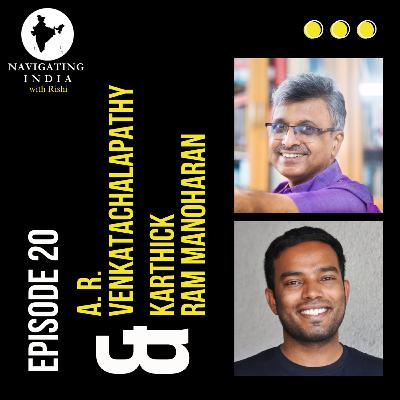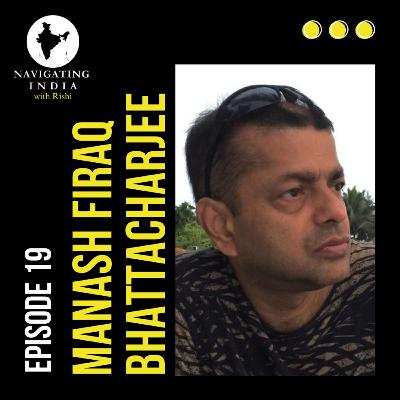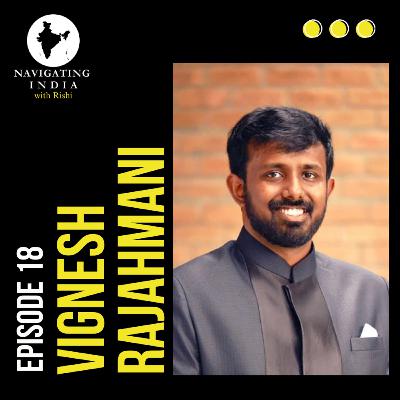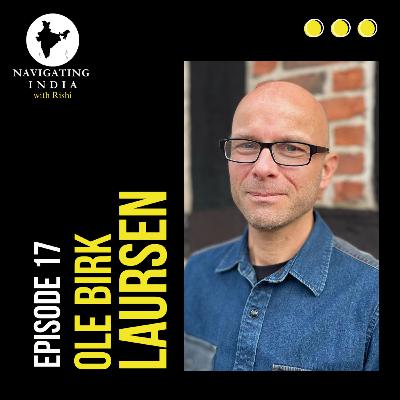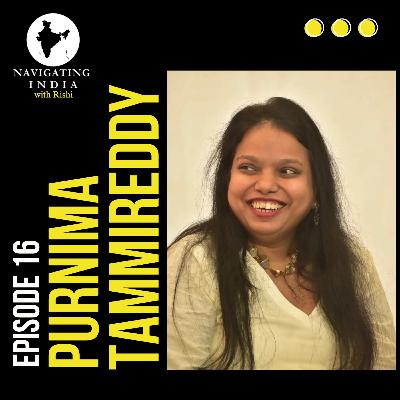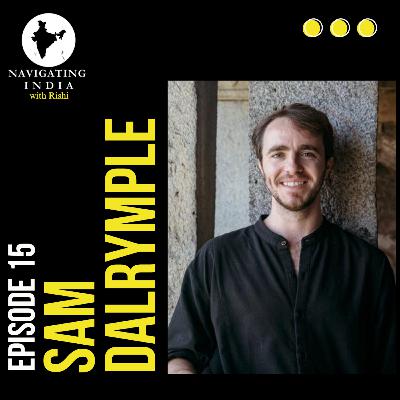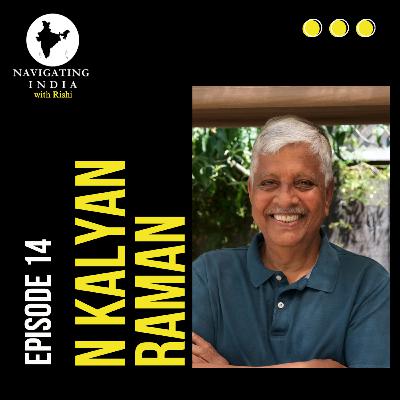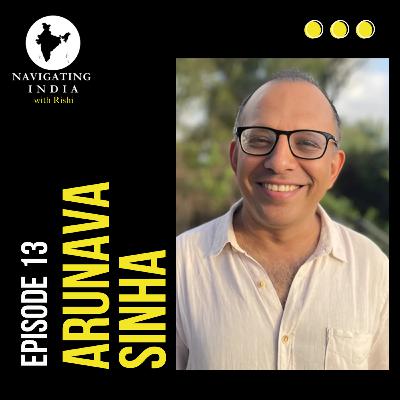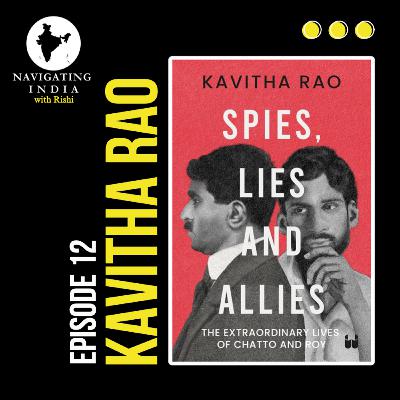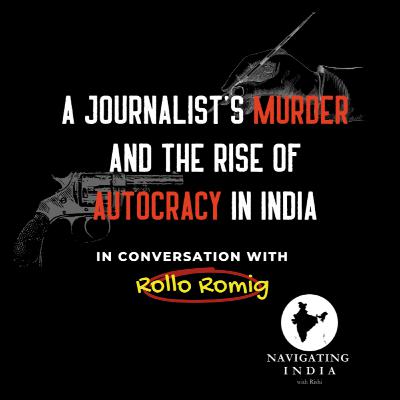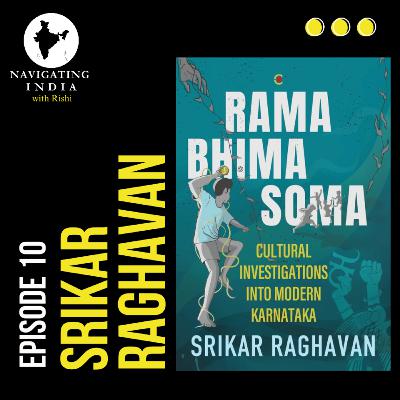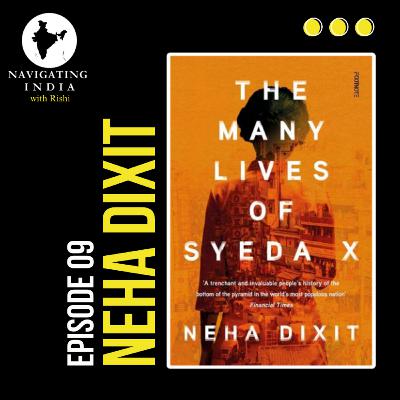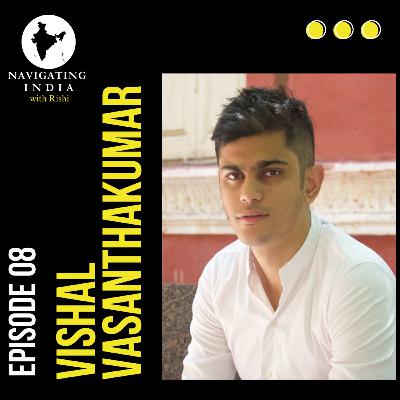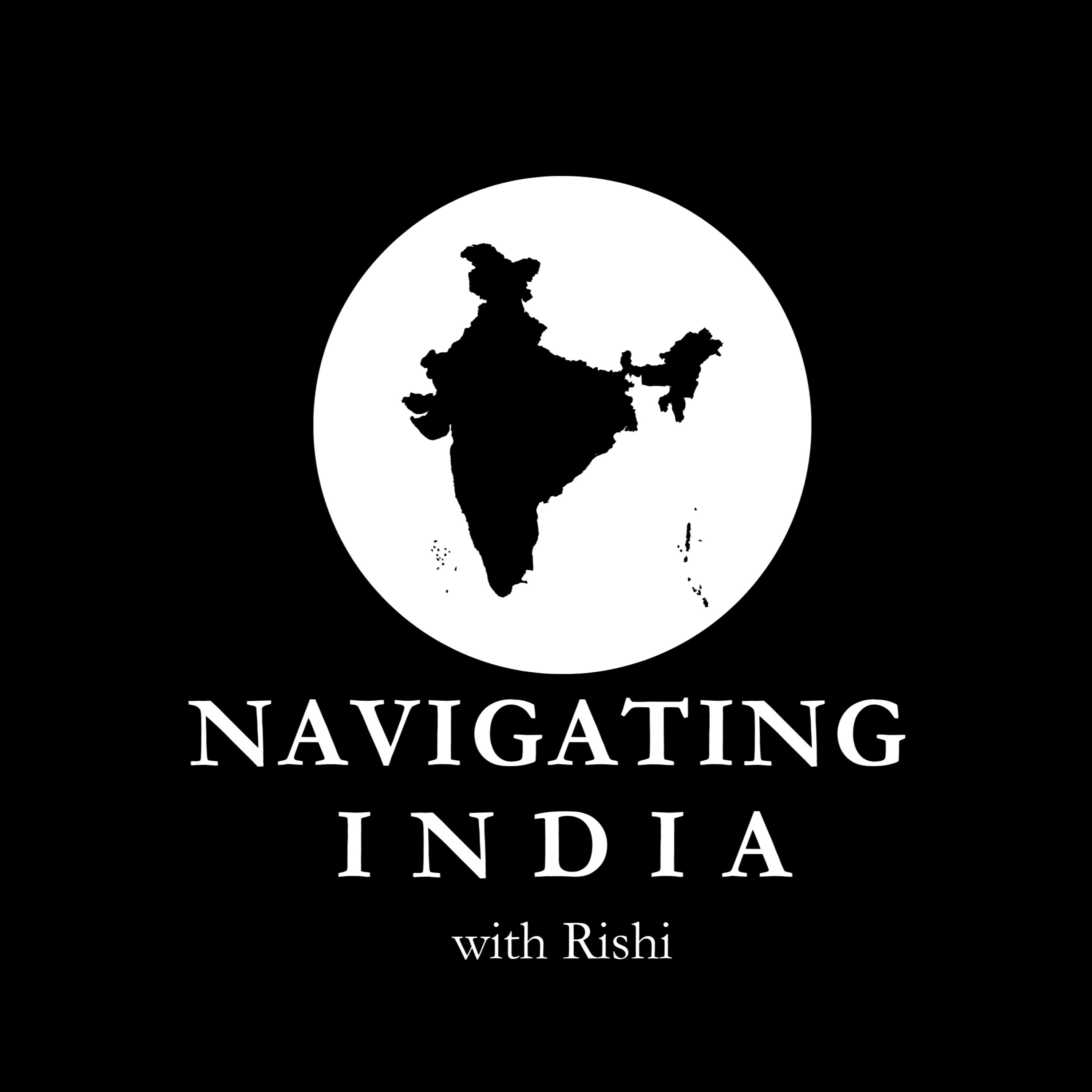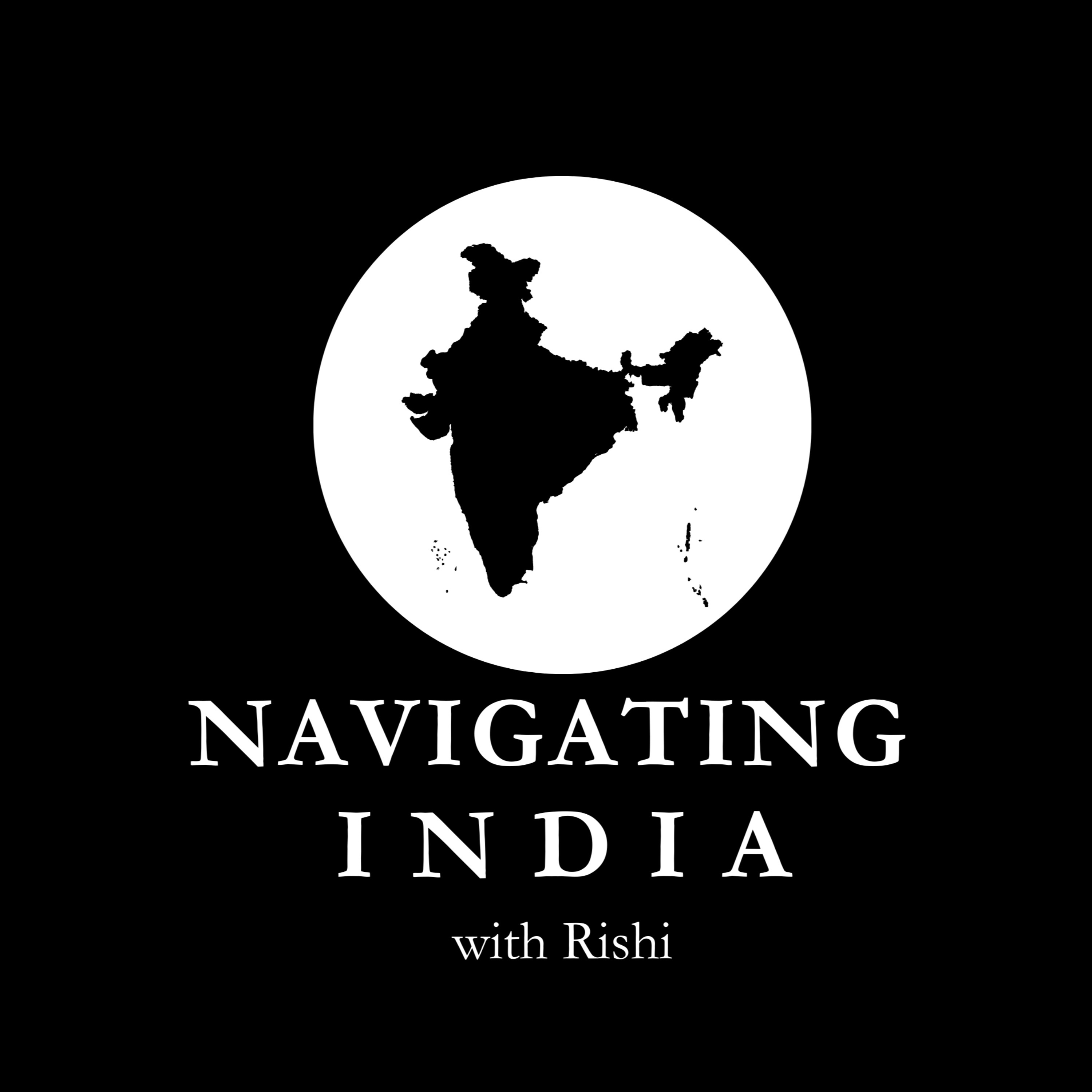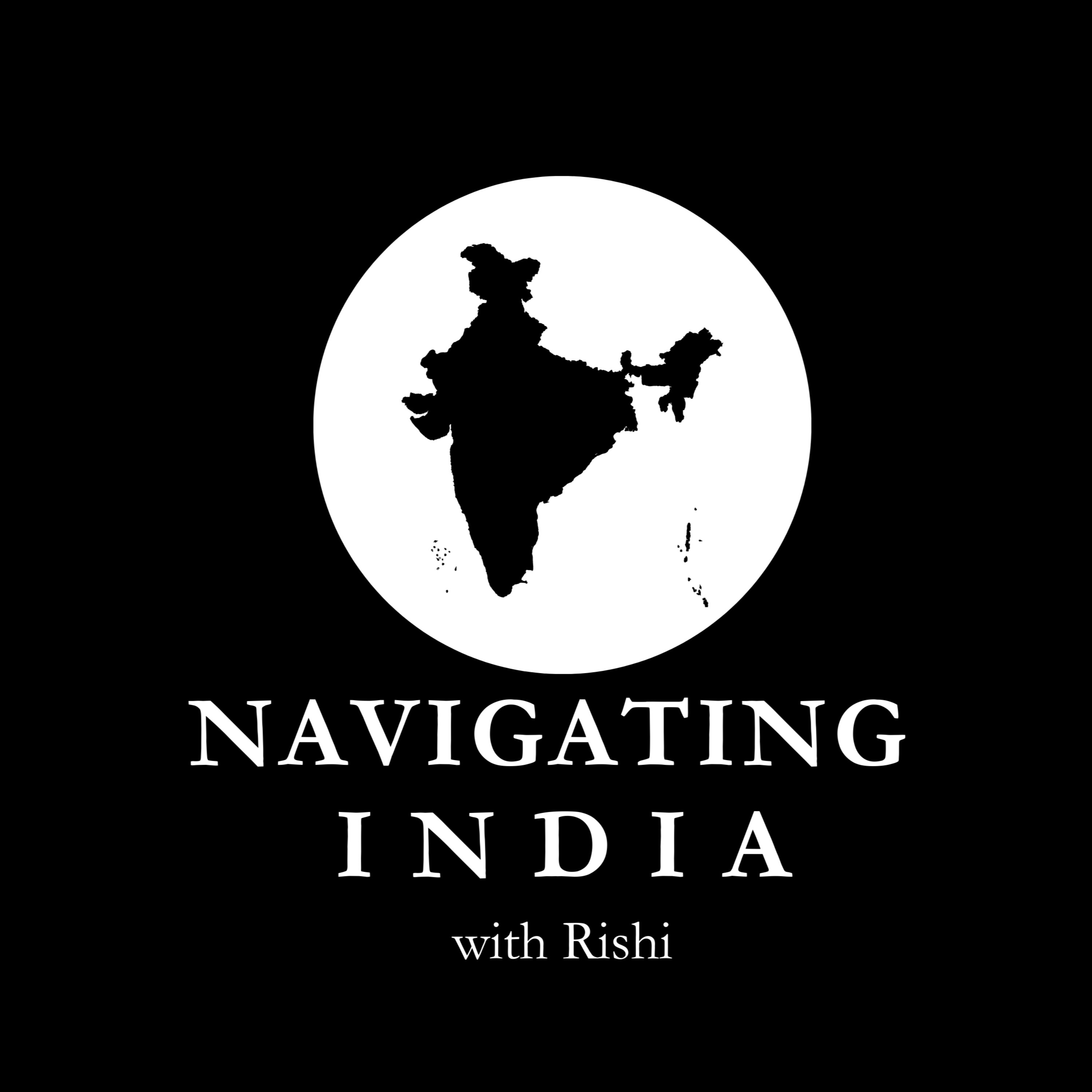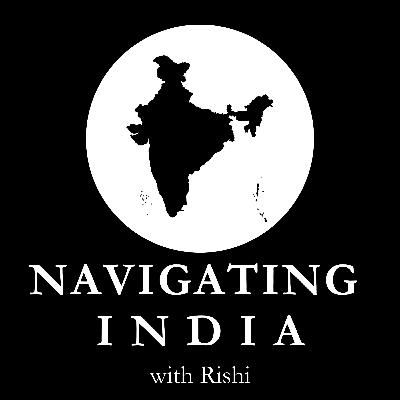Discover Navigating India
Navigating India

Navigating India
Author: Navigating India
Subscribed: 4Played: 9Subscribe
Share
© Navigating India
Description
India is an unnatural nation accommodating multitudes and sustaining a million mutinies. Through conversations with authors, academics, activists and thinkers, this podcast attempts to navigate through the story of this complex nation.
21 Episodes
Reverse
Why is Periyar E.V. Ramasamy Naicker, who passed away over half a century ago, still a controversial yet unavoidable and crucial figure in Tamil Nadu? While this year marks 100 years of the Self-Respect Movement, initiated by Periyar, he was also labelled anti-national, anti-Hindu, anti-Brahmin, and anti-Dalit, generating extreme hate and accusations. Who was Periyar? How did his ideas evolve? What are his key contentions? Did he want a separate country? What was his relationship with Ambedkar, Annadurai, and Kamaraj? How did he leave a lasting impact on the people of Tamil Nadu? In this episode, I’m joined by A. R. Venkatachalapathy and Karthick Ram Manoharan to delve deeper into the life and ideas of Periyar.References:The Cambridge Companion to Periyar, Edited by A. R. Venkatachalapathy and Karthick Ram ManoharanA. R. Venkatachalapathy: Profile, XKarthick Ram Manoharan: Profile, XBooks by A. R. Venkatachalapathy: In Those Days There Was No Coffee, Swadeshi Steam: V.O. Chidambaram Pillai and the Battle against the British Maritime Empire, Who Owns that Song?: The Battle for Subramania Bharati’s Copyright, Tamil Characters: Personalities, Politics, Culture, The Province of the Book: Scholars, Scribes, and Scribblers in Colonial Tamilnadu, The Brief History of A Very Big Book: The Making of the Tamil EncyclopaediaBooks by Karthick Ram Manoharan: Periyar: A Study in Political Atheism, Frantz Fanon: Identity and ResistanceDravidian Movement and Saivites, 1927-1944 by A. R. VenkatachalapathySudras and the Nation: Periyarist Explorations, Freedom from God: Periyar and Religion, In the path of Ambedkar: Periyar and the Dalit question by Karthick Ram ManoharanM.S.S. Pandian: Denationalising the Past-Nation in E V Ramasamy's Political Discourse, Brahmin and Non-Brahmin: Genealogies of the Tamil Political Present V Geetha: Periyar, Women and an Ethic of Citizenship, Towards a Non-Brahmin Millennium: From Iyothe Thass to Periyar (Co-authored with S.V. Rajadurai)Anandhi S.: Women’s Question in the Dravidian Movement c. 1925-1948Robert L Hardgrave Jr: The Nadars of Tamilnad: The Political Culture of a Community in Change Selig S. Harrison: Caste and the Andhra CommunistsLloyd I. Rudolph and Susanne Hoeber Rudolph: The Political Role of India’s Caste AssociationsB.R. Ambedkar: Annihilation of Caste (An Introduction by Arundhati Roy)Vignesh Rajahmani: The Dravidian Pathway: How the DMK Redefined Power and Identity in South IndiaEpisode 18: The Dravidian Pathway: How the DMK Redefined Power and Identity in South India by Vignesh RajahmaniD. Veeraraghavan: Half a Day for Caste? Education and Politics in Tamil Nadu, 1952-55 Nellai R. Jebamani, Cho Ramaswamy, Maraimalai Adigal, K. Veeramani, Maniammai, C.N. Annadurai, K. Kamaraj, J. JayalalithaaBipin Chandra, Aditya Mukherjee, Ranajit Guha, Partha Chatterjee, K. A. Nilakanta Sastri, D.D. Kosambi, Romila Thapar, M.N. Srinivas, Namdeo Dhasal
Gandhi’s method of non-violence faced significant challenges after Jinnah’s declaration of Direct Action Day, continuing until the partition and beyond. The miracle of non-violence seemed to fade, leaving peace as a fleeting hope. To counter the violence, Gandhi walked through areas devastated by violence- Noakhali, Bihar, Calcutta, and Delhi in the last fifteen months of his life, before his tragic assassination. During these travels, he advocated for peace and offered courage to those in need. In his recent book, 'Gandhi: The End of Non-Violence', Manash Firaq Bhattacharjee delves deeper into the questions that remain: Why did a nation that had fought through non-violence descend into violence? What is the psychology behind communal violence? What is non-violence, and how can it transform the human condition? What does it mean ‘to die a beautiful death’? And how can one write the history of a period so tragic? Tune into this episode to find answers to these questions and many others. References:Gandhi: The End of Non-Violence by Manash Firaq BhattacharjeeOther Works by Manash Firaq Bhattacharjee: Nehru and the Spirit of India, Looking for the Nation: Towards Another India of India, The Town Slowly Empties: On Life and Culture During LockdownManash Firaq Bhattacharjee: XHind Swaraj or Indian Home Rule by M.K. GandhiNationalism by Rabindranath TagoreThe Discovery of India by Jawaharlal NehruThe Intimate Enemy: Loss and Recovery of Self under Colonialism by Ashis NandyThe Power Game by Paavo Havikko, translated from Finnish by David BarrettOtherwise Than Being, or Beyond Essence by Emmanuel Levinas, translated from French by Alphonso LingisCivil Disobedience by Henry David ThoreauOn Violence by Hannah ArendtPakistan or the Partition of India by B.R. Ambedkar
How did a transformative socio-cultural movement become an electorally successful political force? To answer this question, we have with us Vignesh Rajahmani. In his book, ‘The Dravidian Pathway’, he illustrates how the Dravidian movement transformed into an electorally viable political party, the Dravida Munnetra Kazhagam (DMK). We also explore the ideas of the Dravidian-Tamil ethos, key agitations led by the DMK, the foundational role of Periyar and the Self-Respect movement, the importance of reading rooms, the language question, and moreReferences:Vignesh Rajahmani: Biography, LinkedIn, X, Instagram The Dravidian Pathway: How the DMK Redefined Power and Identity in South India by Vignesh RajahmaniInclusive growth in Tamil Nadu: The role of political leadership and governance by Kartik Akileswaran and Luca GraziadeiComparative Grammar of the Dravidian or South Indian Family of Languages by Robert CaldwellTamil Nadu’s new assembly in 33 charts: Lowest women representation in 25 years, OBCs dominate by Gilles Verniers, Vignesh Karthik KR, Mohit Kumar and Neelesh AgrawalThe glossary for addressing the LGBTQIA+ Community by the Social Welfare and Women Empowerment Department, Government of Tamil NaduThe Caste System in Tamil Nadu by K.K. PillayCaste and the Andhra Communists by Selig S. HarrisonAnts among Elephants: An Untouchable Family and the Making of Modern India by Sujatha GidlaThe Political Role of India’s Caste Associations by Lloyd I. Rudolph and Susanne Hoeber RudolphThe Nadars of Tamilnad: The Political Culture of a Community in Change by Robert L Hardgrave JrThe Palace of Illusions by Chitra Banerjee DivakaruniThe First Rebels: When Madras was at the forefront of the struggle for Dalit Emancipation by V SobhaMothers in the Fatherland: Women, the Family and Nazi Politics by Claudia KoonzSixteen Stormy Days: The Story of the First Amendment of the Constitution of India by Tripurdaman SinghHalf a Day for Caste? Education and Politics in Tamil Nadu, 1952-55 by D. VeeraraghavanMovies: Mari Selvaraj’s Karnan, Sukumar’s Rangasthalam, RJ Balaji’s Mookuthi Amman
In 1908, an Indian revolutionary from Madras arrived in Marseille, France, and later travelled to Paris, London, Lisbon, New York, Berlin, and Russia with two main objectives: to unveil the brutality of British colonialism and to reject the idea of the universalisation of the nation-state. He made significant contributions to our understanding of resistance to oppression in all its forms, as embodied by the nation-state. He was one of India’s most prominent anarchist activists and theoreticians, M.P.T. Acharya. To explain his life trajectory and the various themes that have shaped it, we are in conversation with historian Ole Birk Laursen.References:Ole Birk Laursen: Website, LinkedInAnarchy Or Chaos: M.P.T. Acharya and the Indian Struggle for Freedom by Ole Birk LaursenWe Are Anarchists: Essays on Anarchism, Pacifism, and the Indian Independence Movement 1923 - 1953 by M.P.T. Acharya, edited by Ole Birk Laursen‘I have only One Country, it is the World’: Madame Cama, Anticolonialism, and Indian-Russian Revolutionary Networks in Paris, 1907–17 by Ole Birk LaursenJohn Steinbeck, Charles Dickens, Samuel Selvon, V.S. Naipaul, George LammingSpies, Lies and Allies: The Extraordinary Lives of Chatto and Roy by Kavitha Rao (Episode 12 of Navigating India)Shattered Lands: Five Partitions and the Making of Modern Asia by Sam Dalrymple (Episode 15 of Navigating India)Magda Nachman: An Artist in Exile by Lina BernsteinThe Ghadar Movement: A Forgotten Struggle by Rana Preet Gill
Purnima Tammireddy is a writer, translator, publisher, and full-time software engineer. For nearly two decades, she has contributed to Telugu literature through short stories, book reviews, and articles on technology, as well as by translating fiction and non-fiction from Hindustani, English, and Kannada into Telugu. She recently translated Volga’s ‘On the Banks of the Pampa’ from Telugu to English.Purnima joins us in this episode to discuss her literary journey, life lessons, her obsession with Manto and partition literature, the Telugu reading community, the craft of translation, gully-cricket, and much more. Sit back and enjoy.References:Purnima Tammireddy: Instagram, FacebookOn the Banks of the Pampa by Volga, translated from Telugu by Purnima Tammireddy ఎలమి | Elami | Telugu Publishing HouseEmotional Pregnancy by Purnima TammireddyJonathan Livingston Seagull by Richard BachThe Sound of the Kiss, or The Story That Must Never Be Told by Pingali Suranna, translated from Telugu by Velcheru Narayana Rao and David ShulmanJabberwock, The Middle Stage, Kiran Kumar Chava, Lekhini.orgSaadat Hasan Manto, Amrita Pritam, Ismat Chughtai, Sughra Humayun Mirza, Premchand, Harishankar Parsai, Srinatha, Yandamuri Veerendranath, Anita Desai, Ruskin Bond, R.K. Narayan, Italo Calvino, Franz Kafka, Jose Saramago, Chandrahas Choudhury, Gulzar, Arshia Sattar, Vanamala Viswanatha, J DevikaBride in the Hills by Kuvempu, translated from Kannada by Vanamala ViswanathaPustakam.netSutradhar theatre group presented a live dramatised reading of Sadat Hasan Manto’s ‘Siyaah Haashiye’Mahaprastanam by Sri SriThe Sixth River: A Journal From The Partition Of India, originally published as Chhata Darya by Fikr Taunsvi, translated by Maaz Bin BilalManto by Nandita Das, Pathala Bhairavi (story and dialogues by Pingali)Ramayan by Ramanand Sagar, Mahabharat by B.R. ChopraNaga-Mangala by Girish Karnad, Ghachar Ghochar by Vivek Shanbhag, translated from Kannada by Srinath Perur
As recently as 1928, a vast region spanning twelve of today’s Asian countries—India, Pakistan, Bangladesh, Burma, Nepal, Bhutan, Yemen, Oman, the UAE, Qatar, Bahrain, and Kuwait—were bound together as a single entity known as the Indian Empire, or simply the Raj. In less than 50 years after 1928, this Indian empire was shattered by five partitions, which created new nations, redrew maps, led to mass migrations, and left behind a legacy of conflict that still haunts the region. What led to these partitions and the creation of new nations? And why is studying these partitions important today in a globalised world? In this episode, Sam Dalrymple joins us to answer these questions. References:Sam Dalrymple: Website, X, Instagram, SubstackShattered Lands: Five Partitions and the Making of Modern Asia by Sam DalrympleProject DastaanAanchal Malhotra, Kavita Puri, Anirudh KanisettiMere Piya Gaye Rangoon from the movie Patanga, sung by Shamshad Begum and C. RamachandraQuote from Jinnah’s Speech, 11 August 1947:Vajpayee: The Ascent of the Hindu Right, 1924–1977 by Abhishek ChoudharyBeliever’s Dilemma: Vajpayee and the Hindu Right's Path to Power, 1977–2018 by Abhishek ChoudharyGandhi’s Assassin: The Making of Nathuram Godse and His Idea of India by Dhirendra K. Jha
In this episode, I am joined by N. Kalyan Raman, a celebrated translator of modern and contemporary Tamil fiction and poetry into English. Our conversation will explore his journey as a translator, the Tamil literary milieu, the process of text selection, the power and significance of translation, the dynamic between author and translator, the challenges faced by translators, and the broader goal of fostering a more robust literary discourse around translated works.References:N Kalyan Raman: Website, X, Published WorksAshokamitran, Sundara Ramaswamy, D. Jayakanthan, Subramania Bharati, Perumal Murugan, Vaasanthi, Devibharathi, PoomaniHeart Lamp: Selected Stories by Banu Mushtaq, translated from Kannada by Deepa BhashtiTomb of Sand by Geetanjali Shree, translated from Hindi by Daisy RockwellPyre by Perumal Murugan, translated from Tamil by Aniruddhan VasudevanPoonachi: Or the Story of a Black Goat by Perumal Murugan, translated from Tamil by N Kalyan RamanOne Part Woman by Perumal Murugan, translated from Tamil by Aniruddhan VasudevanChowringhee by Sankar, translated from Bengali by Arunava SinhaGhachar Ghochar by Vivek Shanbhag, translated from Kannada by Srinath PerurA Southern Harvest (Katha Regional Fiction), edited by Githa HariharanFarewell, Mahatma: Stories, The Solitude of a Shadow by Devibharathi, translated from Tamil by N Kalyan RamanBreaking Free: A Novel by Vaasanthi, translated from Tamil by N Kalyan RamanVaadivaasal, the Arena by C.S. Chellappa, translated from Tamil by N Kalyan RamanVaadivaasal, the Arena by C.S. Chellappa, adapted by Perumal Murugan and Appupen [Graphic Novel]Animal Farm by George OrwellBoats Against the Current: The Kongunadu novels of Perumal Murugan by N Kalyan RamanWhy Perumal Murugan’s “One Part Woman” is Significant to the Debate on Freedom of Expression in India by N Kalyan RamanIndian judge rules novelist silenced by nationalist pressure ‘be resurrected’ by Vidhi DoshiNirmal Verma, Krishna Sobti, Mahasweta Devi, Sunil GangopadhyayThe JCB Prize for Literature has shut down. What else has ended with it? by Arunava SinhaSusan Santag: Quotes on reading and translationWalter Benjamin: The task of the translator
Join us as we converse with Arunava Sinha, India's most prolific translator! We dive into the profound impact of translations, teaching the craft, fostering vibrant translator and reader ecosystems, the influence of AI, and much more.ReferencesArunava Sinha: Website, X, InstagramTranslations Published, Forthcoming and Work in ProgressMeet Arunava Sinha, likely India’s most prolific translator by Priya RamaniMidnight’s Children by Salman RushdieHeart Lamp: Selected Stories by Banu Mushtaq, translated from Kannada by Deepa BhashtiTomb of Sand by Geetanjali Shree, translated from Hindi by Daisy RockwellPyre by Perumal Murugan, translated from Tamil by Aniruddhan VasudevanHow not to (not) teach translation by Arunava SinhaWhy Heart Lamp’s Booker win breaks many barriers by Arunava SinhaLost in Translation: What the first line of “The Stranger” should be by Ryan BloomAshoka Centre for TranslationA Glimpse of My Life: Autobiography of the Indian Revolutionary Ram Prasad Bismil, translated from the Hindi by Awadhesh TripathiThe JCB Prize for Literature has shut down. What else has ended with it? By Arunava SinhaBooks by Sankar, Translated by Arunava Sinha: Chowringhee, The Middlemen, Limited Unlimited, Dear Reader: A MemoirBooks by Manoranjan Byapari, Translated by Arunava Sinha: There’s gunpowder in the air, ImaanBooks by Anita Agnihotri, Translated by Arunava Sinha: A Touch of Salt, 17, SickleMinistry of Utmost Happiness by Arundhati Roy
While India's freedom struggle is often remembered for its nonviolent approach, remarkable individuals like Bhagat Singh, Chandrashekhar Azad, Ram Prasad Bismil, Ashfaqulla Khan, Sukhdev, and Rajguru actively pursued revolutionary methods, conducting rebellious activities within India. Meanwhile, others ventured abroad, forging alliances, securing funds and weapons for Indian revolutionaries, assassinating British officials in London, conspiring against colonial authorities, and establishing organisations, parties, and committees, often while navigating complex love lives. Two such remarkable figures are Virendranath Chattopadhyay, alias Chatto, and M.N. Roy. In this episode, Kavitha Rao chronicles the extraordinary journeys of these two individuals. ReferencesKavitha Rao: Website, X, InstagramBooks: Spies, Lies and Allies: The Extraordinary Lives of Chatto and Roy, Lady Doctors: The Untold Stories of India’s First Women in Medicine, The LibrarianDaughter of the Earth: A Novel by Agnes SmedleyGiulia Lazzari by Somerset MaughamThe Multiple Careers of Kamaladevi Chattopadhyay: In conversation with Nico Slate- Episode 7 of Navigating India Transnational resistance and fictive truths: Virendranath Chattopadhyaya, Agnes Smedley and the Indian nationalist movement by Purnima BoseA Glimpse of My Life: Autobiography of the Indian Revolutionary Ram Prasad Bismil, translated from the Hindi by Awadhesh TripathiWhy have Indian historians failed to combat ‘WhatsApp history’? By Shoaib DaniyalRamachandra Guha, Peter Frankopan, William Dalrymple, Manu S Pillai, Srikar Raghavan, Ira Mukhoty, Rollo Romig, Sam DalrympleRama Bhima Soma: Cultural Investigations into Modern Karnataka: In Conversation with Srikar Raghavan- Episode 10 of Navigating IndiaNew India FoundationA Journalist’s Murder and the Rise of Autocracy in India: In conversation with Rollo Romig- Episode 11 of Navigating IndiaGender bias in men’s reading habits still exists by Claire Shanahan: “This research confirms that while women read books by women and men equally, men overwhelmingly reject books written by women in favour of male authors”
On September 5th, 2017, activist and journalist Gauri Lankesh was shot in front of her house in the city of Bangalore. In January 2025, the last of the accused in the Gauri Lankesh murder case was granted bail. No one has been convicted in this case yet. Who killed Gauri Lankesh? Who wanted her silenced? What was her true legacy? And what are the consequences of her assassination for journalism, activism, and democracy in India? Pulitzer Prize finalist author and journalist Rollo Romig joins in this episode to discuss these questions and many moreReferences: Rollo Romig: Website, InstagramBook: I Am on the Hit List: Murder and Myth-making in South IndiaLast Accused In Custody For Journalist Gauri Lankesh's Murder Gets Bail, 17 Accused Out On Bail While One Absconds by Mustafa PlumberGround report: Behind Karnataka BJP's ‘jihadi’ murder list, more than Hindutva and Islamist clashes by Sruthisagar YamunanHave ‘jihadis’ killed 23 Hindutva activists in Karnataka since 2014 as BJP claims? by Sruthisagar YamunanGauri Lankesh's killers just did the job our society had designed for them by TM KrishnaThe end of rule of law in America by J. Michael Luttig‘Electoral autocracy’: The downgrading of India’s democracy by Soutik BiswasLooking back 2024: Most dangerous places for journalists by Gautam Nirmal DoshiHow to steal a river by Rollo RomigAgni Sreedhar: InstagramMy Days in the Underworld- Rise of the Bangalore Mafia by Agni SreedharIndia's newspaper revolution: capitalism, politics, and the Indian-language press, 1977-99 by Robin JeffreySpeaking of Shiva by A.K. RamanujanWho is Luigi Mangione, CEO shooting suspect? by Madeline Halpert & Mike WendlingRama Bhima Soma: Cultural Investigations into Modern Karnataka- In Conversation with Srikar Raghavan- Episode 10 of Navigating IndiaThe Adversary by Srikar Raghavan
In this episode, I am in conversation with Srikar Raghavan about his book, ‘Rama Bhima Soma: Cultural Investigations into Modern Karnataka’. With rigorous research and profound sensitivity, this work examines the trajectories of Karnataka’s Literary, Trade Union, Naxal, Dalit, Socialist and Environmental movements. It also delves into the genesis and contradictions of all the major ideologies that have operated within the state and highlights the contributions of several individual figures, including Saketh Rajan, Syed Issaq, Shankar Mokashi Punekar, Shantaveri Gopala Gowda, Dr. Rajkumar, Pratibha Nandakumar, M.K. Indira, U.R. Ananthamurthy, S.L. Byrappa, and Ram Manohar Lohia. This episode and the book itself offer a scholarly exploration of the ideas, events, biographies, and movements that have significantly shaped the cultural and social fabric of Karnataka. References: Srikar Raghavan: About, Twitter, InstagramRama Bhima Soma: Cultural Investigations into Modern Karnataka by Srikar RaghavanRama Bhima Soma WebsiteEssays by Srikar Raghavan: The Adversary (On Saketh Rajan and Naxalism in Karnataka), Running after the light: Mudnakudu Chinnaswamy’s writing searches for a new moral orderHeart Lamp: Selected Stories by Banu Mushtaq, translated by Deepa BhasthiChomana Dudi by Kota Shivarama KaranthProvincials: Postcards from the Peripheries by Sumana Roy (Review by Srikar Raghavan)Bringing Ambedkar and Gandhi together by Ramachandra GuhaThe Flaming Feet and Other Essays: The Dalit Movement in India by D.R. NagarajThe Life and Times of George Fernandes by Rahul Ramagundam (Spotify, Apple Podcasts)Chomana Dudi, Moga Padeda Mana by Kota Shivarama KaranthRemembering U R Ananthamurthy by Chandan GowdaU R Ananthamurthy: Samskara: A Rite for a Dead Man (Translated from Kannada to English by A K Ramanujan), Bharathipura (Translated from Kannada to English by Susgeela Punitha), Avasthe (Translated from Kannada to English by Narayan Hegde)Vamshavriksha, Daatu by S L Byrappa Varadambika Parinaya Campu of Tirumalamba (Translated from Sanskrit to English by Sujatha Reddy)Songs for Siva: Vacanas of Akka Mahadevi (Translated by Vinaya Chaitanya)Tungabhadhra by M K IndiraA Part Apart: The Life and Thought of B.R. Ambedkar by Ashok GopalStaging a folk epic by Sweekruthi K (On Daklakatha Devikavya, a play adapted from works of K.B. Siddaiah)Making History: Karnataka’s People and their Past- Volume I (Stone Age to Mercantilism), II (Colonial Shock, Armed Struggle) by Saki (alias Saketh Rajan)Naanembudu Kinchittu (Autobiography) by Dr. Mogalli GaneshHow the Brahmins Won: From Alexander to the Guptas by Johannes BronkhorstWho was Shivaji by Govind Pansara Library with 11,000 books burnt down in Mysuru, librarian vows to rebuild it by Sanjana DeshpandeSyed Issaq- Mysuru’s ‘library man’ rebuilds his dream, on his own labour by Karthik KKSri Ramayana Darshanam by Kuvempu (Translated from Kannada to English by S M Punekar)
In this episode, I am in conversation with Neha Dixit about her new book, ‘The Many Lives of Syeda X: The Story of an Unknown Indian’- an outcome of 9 years and more than 900 interviews to tell the story of an ordinary working-class faceless Indian woman, from the early 1990s to the present day.
We also discuss her journey as a journalist since 2007 and her extraordinary resolve to report the ground realities of the ‘New India’ in the face of increased corporatisation of the media, ongoing law and order cases and criminal cases against her that take years in the court of law (two days after recording this episode, she had to appear for a hearing in Guwahati), imminent threats and intimidation.
References:
Neha Dixit: Journalism, Twitter, Scroll, The Wire, Outlook
The Many Lives of Syeda X: The Story of an Unknown Indian by Neha Dixit
The Other Side of Silence: Voices from the Partition of India by Urvashi Butalia
Operation #BetiUthao: The Sangh’s Stolen Child Crusade
A Chronicle of the Crime Fiction That is Adityanath’s Encounter Raj
For Haryana Police, the Holy Cow Is an Excuse for Extra-Judicial Killings
Muzaffarnagar riots: This graphic narrative tells the story of the courage of seven rape survivors
What does education do? Whose needs are being met by education? What does education mean to different people? Why did schooling fall short in providing equality of opportunity? Vishal Vasanthakumar joins us in this episode to illustrate the complex issues involved in the provision and purpose of education in India.
References:
Vishal Vasanthakumar: LinkedIn, Twitter, Cambridge Website
Following Fish: Travels around the Indian coast by Samanth Subramanian
Slouching towards Bethlehem by Joan Didion
Behind the Beautiful Forevers: Life, Death, and Hope in a Mumbai Undercity by Katherine Boo
Empire of Pain: The Secret History of the Sackler Dynasty by Patrick Radden Keefe
Secondhand Time: The Last of the Soviets by Svetlana Alexievich
The Shadow of the Sun: My African Life by Ryszard Kapuscinski
China in Seven Banquets: A Flavourful History by Thomas David DuBois
The forms of capital by Pierre Bourdieu
The Tyranny of Merit: What’s Become of the Common Good? By Michael J. Sandel
Kamaladevi Chattopadhyay stands among very few freedom fighters who imagined 'Freedom' in transnational terms meaning to end exploitation everywhere and of every form. She espoused an expansive idea that will contribute to individual as well as collective growth and evolution. Very few Indians could match her in terms of her travels to countries across the world (England, Germany, Denmark, China, Japan, United States, Srilanka, etc), the relations she forged with leaders worldwide and the multiple fields she straddled in(nationalist politics, socialist politics, women’s movement, education, refugee rehabilitation, theatre, cinema, renewal of handicrafts).
In this episode, I am in conversation with Nico Slate to talk about his recent biography ‘Kamaladevi Chattopadhyay: The Art of Freedom’.
Nico Slate is a Professor of History and Head of the Department of History at Carnegie Mellow University. His research focuses on democracy and social movements in the United States and India. He is the author of six books: The Art of Freedom: Kamaladevi Chattopadhyay and the Making of Modern India (HarperCollins India and the University of Pittsburgh Press, 2024); Brothers: A Memoir of Love, Loss, and Race (Temple University Press, 2023); Lord Cornwallis Is Dead: The Struggle for Democracy in the United States and India (Harvard University Press, 2019); Gandhi’s Search for the Perfect Diet: Eating with the World in Mind (University of Washington Press, 2019); The Prism of Race: W.E.B. Du Bois, Langston Hughes, Paul Robeson and the Colored World of Cedric Dover (Palgrave Macmillan, 2014); and Colored Cosmopolitanism: The Shared Struggle for Freedom in the United States and India (Harvard University Press, 2012).
In this episode, I am in conversation with Rahul De, to discuss the key ideas in his book ‘A History of Economic Policy in India: Crisis, Coalitions and Contingency’. Rahul takes us through the meaning of economic history and the need for studying it. He situates industrial development in colonial India and its integration with the global economy. Rahul meticulously and candidly explores the failure of the Indian variant of planning, the reality of the green revolution and changes in voting behaviour, the evolution of liberalisation, and defining what can make a coalition government successful. Don’s miss this episode.
References:
Rahul De: A History of Economic Policy in India: Crisis, Coalitions, and Contingency
Empire: How Colonial India Made Modern Britain by Aditya Mukherjee
Planning Democracy: Modern India’s Quest for Development by Nikhil Menon
India’s Political Economy 1947-2004: The Gradual Revolution by Francine R. Frankel
Technological Change and Political Turnover: The Democratizing Effects of the Green Revolution in India by Aditya Dasgupta
The Basic Approach by Jawaharlal Nehru
India’s Political Economy 1947-2004 by Francine R. Frankel
Industry and Empire: The Birth of the Industrial Revolution by Eric Hobsbawm
The Bombay Plan: Blueprint for Economic Resurgence (Edited by Sanjay Baru and Meghnad Desai)
Tirthankar Roy Website
In this episode, I am in conversation with Rahul Ramagundam to talk about his book, ‘The Life and Times of George Fernandes’. George was a rare individual in politics, who did not care about his self-image or about leaving behind a legacy. His life was his legacy. In 1984, in a note exchanged with Jaya Jaitly, he writes, “There is a commitment to a cause that is much bigger than ourselves, howsoever hopeless that cause may look, and howsoever inadequate we may appear to be in fighting that cause—the cause of remaking our country”- a statement that reflects how his only commitment is to ‘remaking our country’.A photograph of George “with a defiant fist of a shackled hand raised above the proud bespectacled face, jaw clenched, beads of perspiration trickling down his forehead, veins standing out on his throat” taken when he was held by the police during Emergency symbolised his iron-will to protect the nation from sliding into a dictatorship. That image also motivated Rahul Ramagundam to write a biography of George, which took him 12 years. His book is a superb biography which reads like a novel tracing the trajectory of Indian politics post-Independence. More specifically, this book narrates the complex story of the Socialist Party in many forms till its demise in 1977. The author writes, “Now, it can be said, safely perhaps and with impeccable historical hindsight, that the fate of the political organization, founded in 1934 and annihilated in 1977, was doomed at its very genesis. The ideological choices that it made, the political trajectory it took, the power games that it so ambitiously unfolded, had just one end and that was its end. Of course, between what was founded in 1934 and what went bust in 1977, two years before the death of its veteran leader JP (in that sense, it was with JP that the party was born and died), there were a series of tragic mishaps that define socialism in India”. George was a man of action, around the clock. Madhu Dandavate called him an “impulsive leader who crossed reasonable limits all the time”. But he holds many other qualities. Narrating about George’s role in the trade union movement, Rahul writes, “Aggression, commitment and dedication would be staples on which he would build one success after another. His passionate commitment, his sharp oratory, his diligence, unmindful of personal comfort, all drew municipal workers in a body, undivided by primordial loyalties or professional categories. Within a very short time, with an iron-hot determination, by overcoming their constricting categories, he succeeded in welding a disparate municipal workforce into one dedicated organization. Nothing could stop him any more, not even the challenging condition of massive unemployment”. He was someone who “revelled in action soaked in the swear of the working people”. George was also not someone who wasted his time on ideological debates but was more focused on creating an impact for his people. He was not a ‘static’ politician, but someone who responded to changing times. In this episode, Rahul Ramagundam discusses the complex story of George Fernandes, his socialist party, Indira Gandhi’s Emergency, his relationship with his wife, his role as a cabinet minister, and his religion. We also discuss the trials and tribulations of a biographer in India- the journey of Rahul Ramagundam in trying to access a variety of sources and the importance of sorting and making archives available easily for researchers. References: The Dream of a Revolution: A Biography of Jayaprakash Narayan by Bimal Prasad and Sujata Prasad Books by Rahul Ramagundam: The Life and Times of George Fernandes (2022), Including the Socially Excluded: India’s Experience with Caste, Gender and Poverty (2017) and Gandhi’s Khadi: A History of Contention and Conciliation (2008)Gandhi: The Years that Changed the World by Ramachandra GuhaGandhi as Mahatma: Gorakhpur District, Eastern UP, 1921-2 by Shahid Amin, Subaltern Studies Volume- IIIWorks in Progress: A Struggle to Publish BR Ambedkar’s Writing by Aathira KonikkaraIn Pursuit of Ambedkar: A Memoir by Bhagwan DasThe Great Indian Coalition: What the Mahagathbandhan leaders can learn from Ram Manohar Lohia by Akshaya MukulChaudhuri Charan Singh: An Indian Political Life by Paul R BrassPaul R Brass: An Indian political life: Charan Singh and Congress Politics (Volume 1,2,3) This is a public episode. If you would like to discuss this with other subscribers or get access to bonus episodes, visit navigatingindia.substack.com
In this episode, I am in conversation with Professor Rajshree Chandra, to talk about her book, ‘Competing Nationalism: The Sacred and Political Life of Jagat Narain Lal’, the biography of her grandfather. Jagat Babu was a key leader in the Indian National Congress and played an important role in national movement, especially in Bihar. He was also a member of the Constituent Assembly and minister for Law and Animal Husbandry in the Bihar government post-independence. In her work, Rajshree traces the life and ideas of Jagat Babu and shows us how his life as a microcosm reflects the trajectory of Indian nationalism and the dilemmas of nationalists. She narrates the journey of Jagat Babu through four pathways: Ascetic, Hindu Nationalist, Anti-Colonial and Civic nationalisms. Rajshree talks about how Jagat Babu navigated through and sometimes attempted to refashion these four pathways. Towards the end, Rajshree reflects on forms taken by these nationalisms in contemporary times. This episode will leave us with several lessons to reflect upon. Rajshree Chandra is a professor of political science at Janki Devi Memorial College, Delhi University, and is a senior visiting fellow at Centre for Policy Research. This is a public episode. If you would like to discuss this with other subscribers or get access to bonus episodes, visit navigatingindia.substack.com
In this episode, I am in conversation with Dr Dev Nath Pathak about his new paper titled 'COVID-19 Cuts in Sociology of South Asia', published in Economic and Political Weekly. Pathak spoke with absolute candour about the tradition of crisis mongering in social sciences, obsession with positivism, need for writing a very honest and hard-hitting polemics on the academic conferences, offered a critique on nation-building and the cancel culture in academia. He laments on how many of the academic conferences in South Asia and other parts of the world have became big talk-shows where one might not witness any real intellectual disputes. Admitting to the institutional constricts present, he calls upon scholars to taking risks and finding ways forward, raising above existential anxieties- “who has stopped individual scholar from practicing intellectual freedom”. He also reminds us of the history of social sciences in the beginning where these was openness to learn from different sources, and how the long drawn process of standardisation of the discipline forced scholars to stick to the new boundaries. These and many other things….I admire his frankness and I am certain, this conversation with be a source of delight and deep introspection to all the listeners. Towards the end, Pathak suggests two songs to listen to after you finish this podcast: I have a Dream by Abba, Circle of Life from The Lion King. Don’t miss them. Dev Nath Pathak teaches at the Department of Sociology, South Asian University, New Delhi. His books include In Defence of the Ordinary: Everyday Awakenings and To Be or Not to Be Sociological: Methodological Ways of Seeing (forthcoming). This is a public episode. If you would like to discuss this with other subscribers or get access to bonus episodes, visit navigatingindia.substack.com
In this episode, I am in a short conversation with author, translator and medical officer Hansda Sowvendra Shekhar, where we reflect on some key themes that influenced and informed his works. His debut novel, The Mysterious Ailment of Rupi Baskey, won the Sahitya Akademi Yuva Puraskar award in 2015. His second book, The Adivasis Will Not Dance: Stories, is a path-breaking text in subaltern and post-colonial literature. He recently translated ‘Kaale Adhyaay’ by Manoj Rupda from Hindi to English, titled I named my sister Silence. He also authored several interesting essays in leading newspapers and magazines. My favourites: Leaving the egg for the end, Discrimination-eva Jayate and A Blooming Garden. Also, read A Poem for the Ol-Chiki - by Sokhen Tudu - translated from Santhali to English by Sowvendra, illustrating how the Santhali language became a ground for conflict between three different scripts: Roman, Deanagari, and Ol-Chiki. This is a public episode. If you would like to discuss this with other subscribers or get access to bonus episodes, visit navigatingindia.substack.com
In the first episode, I am in conversation with Aakash Singh Rathore, philosopher, biographer and Ironman triathlete to discuss his Volume 1 of Dr. B.R. Ambedkar's biography, Becoming Babasaheb: The Life and Times of Bhimrao Ramji Ambedkar: Birth to Mahad (1891-1929). Audio Editor: Niveditha This is a public episode. If you would like to discuss this with other subscribers or get access to bonus episodes, visit navigatingindia.substack.com


